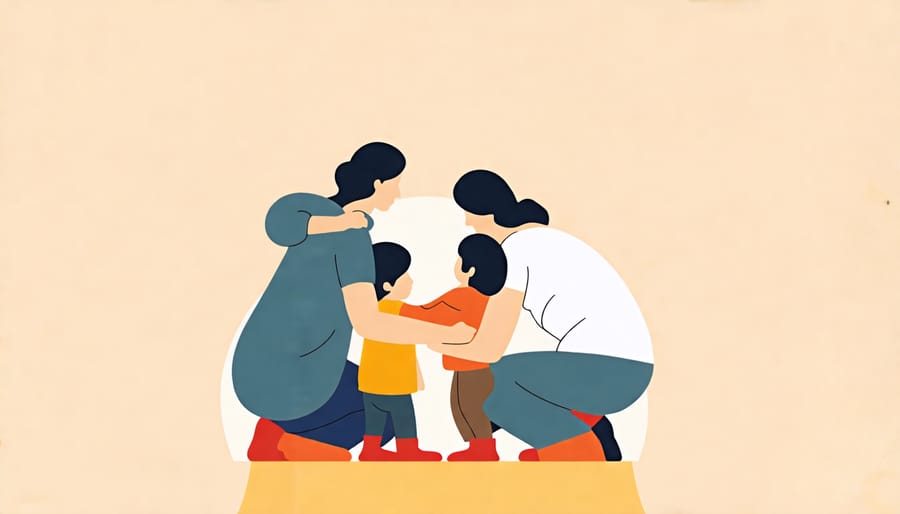Cultivate open, honest communication within your family to foster trust and emotional connection. Establish clear expectations and boundaries while allowing age-appropriate autonomy to promote independence and responsibility. Model and encourage healthy conflict resolution skills, such as active listening, empathy, and compromise, to navigate disagreements constructively. Prioritize quality family time and shared activities that align with your values and nurture children’s mental well-being, creating a strong foundation of love, security, and support.
Establish Open Communication

Active Listening
Active listening is a powerful tool for understanding each other’s perspectives within a family. It involves giving your full attention to the speaker, acknowledging their feelings, and reflecting back what you’ve heard to ensure clarity. When practicing active listening, focus on the speaker’s words, tone, and body language. Resist the urge to interrupt, offer advice, or formulate your response while they are speaking. Instead, ask open-ended questions to gain deeper insight into their thoughts and emotions. Paraphrase what you’ve heard to demonstrate understanding and validate their experience. By creating a safe, non-judgmental space for open dialogue, active listening can foster empathy, trust, and stronger emotional connections within the family. Remember, the goal is not to solve problems immediately, but to truly understand each other’s viewpoints as a foundation for finding solutions together. With patience and practice, active listening can transform family communication and strengthen the bonds between loved ones.
Expressing Feelings
Teaching children to express their feelings in a healthy way is crucial for their emotional well-being and development. Encourage open communication by creating a safe, non-judgmental environment where kids feel heard and validated. Model healthy emotional expression by sharing your own feelings and demonstrate appropriate ways to manage emotions, such as deep breathing or talking it out. Help children identify and name their emotions, using age-appropriate language and examples. Encourage them to use “I” statements when expressing their feelings, such as “I feel sad when…” or “I get frustrated when…” Teach problem-solving skills and brainstorm positive ways to cope with difficult emotions, like drawing, writing, or physical activity. Reinforce the importance of empathy and considering others’ feelings. Remember, every child is unique, so be patient and supportive as they learn to navigate their emotional world. With guidance and practice, they’ll develop the skills to express themselves effectively and build strong, healthy relationships.
Set Clear Boundaries and Expectations
Setting clear boundaries and expectations is essential for helping children feel secure, develop self-discipline, and thrive emotionally. Communicate your expectations for behavior in a calm, direct manner using age-appropriate language. Be specific about rules, consequences, and rewards to avoid confusion. Consistency is key – follow through on consequences and praise positive behavior to reinforce your message.
Tailor boundaries to your child’s developmental stage. Toddlers need simple, concrete rules to ensure safety and begin learning self-control. As kids grow, collaboratively set expectations that give them more autonomy while maintaining important limits. For teens, negotiate reasonable boundaries around curfew, technology use, and responsibilities.
Model respectful communication when discussing expectations. Listen to your child’s perspective and validate their feelings, even if you disagree. Authoritative parenting – being warm and responsive while also setting firm limits – helps kids feel respected and fosters cooperation.
Regularly review and adjust boundaries as your child matures. Involve them in problem-solving as they gain critical thinking skills. Empowering kids to have a voice, within reason, helps them internalize your values and develop good judgment.
Remember, slip-ups are normal as children learn and test limits. Respond with empathy, logical consequences, and opportunities to try again. Investing time in setting clear, fair expectations pays off in kids’ long-term mental health and family harmony.

Foster Emotional Connection
Fostering emotional connection with your child is essential for their mental health and overall well-being. One of the most effective ways to strengthen this bond is by spending quality time together. This doesn’t necessarily mean planning elaborate outings or activities; sometimes, the most meaningful moments happen during everyday routines like sharing meals, reading bedtime stories, or simply having heart-to-heart conversations.
Showing affection is another crucial aspect of building emotional connection. Physical touch, such as hugs, kisses, and gentle pats on the back, can help your child feel loved and secure. Verbal affection is equally important – expressing your love, pride, and appreciation for your child regularly can boost their self-esteem and emotional resilience.
Engaging in shared activities that you both enjoy can also deepen your bond. Whether it’s playing a favorite game, working on a craft project together, or exploring a new hobby, these experiences create lasting memories and provide opportunities for laughter, learning, and emotional growth.
Remember, fostering emotional connection is an ongoing process that requires consistency, patience, and genuine presence. By prioritizing quality time, showing affection, and engaging in shared activities, you’re laying the foundation for a strong, supportive relationship that will help your child thrive emotionally and mentally.
Encourage Individual Growth
When it comes to supporting individual growth within a family, it’s essential to create an environment that celebrates the unique talents, interests, and aspirations of each member. By encouraging exploration and personal development, you foster a sense of self-confidence and independence in your children.
One way to support individual growth is by actively listening to your child’s passions and goals. Show genuine interest in their hobbies, and engage in conversations that allow them to express their thoughts and dreams freely. Offer guidance and resources to help them pursue their interests, whether it’s enrolling them in classes, providing materials, or connecting them with mentors in their chosen fields.
It’s also crucial to recognize and praise each family member’s unique strengths and accomplishments. Celebrate milestones, both big and small, to reinforce the value of their efforts and dedication. However, be mindful not to compare siblings or place undue pressure on them to excel in specific areas. Instead, emphasize the importance of personal growth, resilience, and the joy of learning.
Encourage your children to step out of their comfort zones and try new experiences. Expose them to diverse activities, people, and ideas that broaden their perspectives and help them discover hidden talents. Foster a growth mindset by framing challenges as opportunities for learning and improvement rather than failures.
Remember, supporting individual growth is an ongoing process that requires patience, understanding, and adaptability. By creating a nurturing environment that values each family member’s unique journey, you empower your children to become confident, well-rounded individuals who are equipped to navigate life’s challenges and pursue their dreams.
Manage Conflicts Constructively
Problem-Solving Together
When working together to solve problems as a family, it’s essential to create an environment where everyone feels heard and valued. Start by setting aside dedicated time for family meetings where you can openly discuss challenges and brainstorm solutions together. Encourage each family member to share their perspective without judgment, and actively listen to one another. Work on finding common ground and compromises that address everyone’s needs.
Remember that problem-solving is a skill that can be learned and improved with practice. Model effective problem-solving strategies for your children, such as breaking down complex issues into manageable steps, considering multiple viewpoints, and staying focused on finding solutions rather than dwelling on the problem itself. Celebrate small successes along the way and acknowledge the efforts of each family member in working towards a resolution.
By collaborating as a family to tackle challenges, you not only find effective solutions but also strengthen your family bonds and teach valuable life skills that will serve your children well into adulthood.

Apologizing and Forgiving
When conflicts arise, family members must take responsibility for their role and apologize sincerely. This involves acknowledging the hurt caused, expressing remorse, and committing to change. Equally important is the ability to forgive. Holding grudges perpetuates negativity and hinders healing. Forgiveness doesn’t mean condoning hurtful actions but rather choosing to let go of resentment. It’s a process that requires empathy, understanding each person’s perspective and vulnerabilities. By fostering a culture of accountability and compassion, families can work through challenges, mend relationships, and grow closer. Encourage open discussions about emotions and needs, and model apologizing and forgiving in your own interactions. Remember, every family member deserves the opportunity to make amends and feel accepted. With patience and practice, your family can build resilience and strengthen your bonds.
Seek Professional Help When Needed
It’s essential to recognize when family dynamics or a child’s mental health concerns require professional intervention. If you notice persistent changes in your child’s behavior, mood, or academic performance, it may be time to seek guidance from a mental health professional. Signs that your child might benefit from additional support include prolonged sadness, anxiety, anger outbursts, social withdrawal, or difficulty coping with stress. Similarly, if your family is experiencing chronic conflict, communication breakdowns, or struggles to adapt to significant life changes, consider reaching out to a licensed therapist or counselor.
Remember, seeking help is a sign of strength, not weakness. Mental health professionals have the expertise to assess your child’s needs, provide evidence-based treatments, and offer invaluable insights into fostering a healthy family environment. They can also guide you in developing effective parenting strategies and communication skills tailored to your unique situation. In some cases, family therapy may be recommended to address systemic issues and promote positive interactions among family members. Don’t hesitate to reach out for support – early intervention can make a significant difference in your child’s well-being and your family’s overall resilience in navigating life’s challenges.
Nurturing healthy family dynamics is an ongoing, lifelong process that requires intention, commitment, and a willingness to grow and adapt. By consistently applying the strategies discussed in this article, such as practicing open communication, fostering emotional connection, resolving conflicts constructively, and maintaining a supportive home environment, families can cultivate resilience and promote the children’s well-being. It’s essential to remember that no family is perfect, and challenges are a natural part of the journey. What matters most is the collective effort to create a loving, stable foundation where each family member feels valued, heard, and supported. As parents and caregivers, investing time and energy into building and maintaining a healthy family dynamic is one of the most significant contributions we can make to our children’s overall development and long-term success. By nurturing these positive relationships and modeling healthy interactions, we equip our children with the tools they need to navigate life’s challenges, form meaningful connections, and ultimately thrive as individuals and future members of society.







